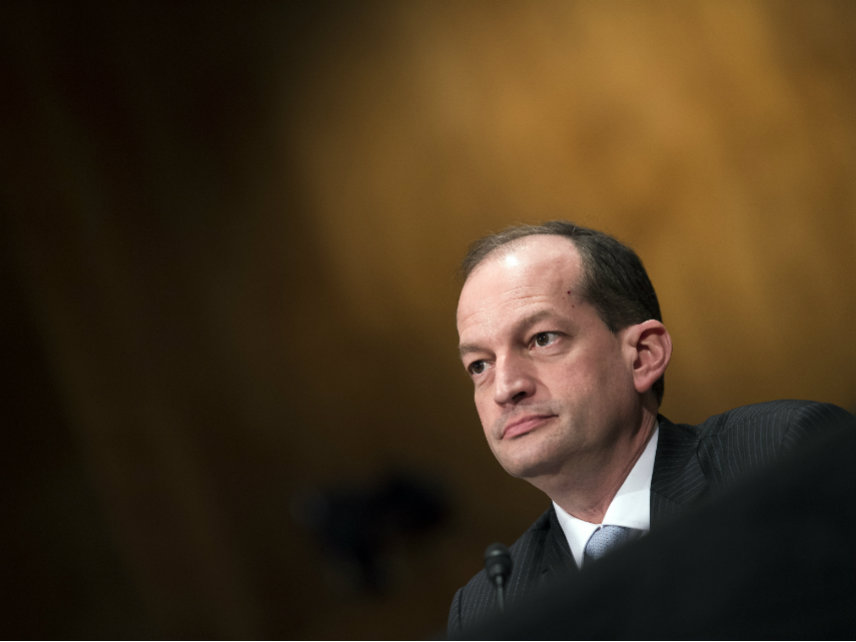Trump's Labor Secretary Tells State Lawmakers: 'Fix Occupational Licensing'
Labor Secretary Alexander Acosta says excessive licensing hinders the American workforce, reduces economic opportunities.

Labor Secretary Alexander Acosta says state lawmakers should work to eliminate unnecessary state licenses.
Speaking Friday to state lawmakers gathered in Denver for the annual American Legislative Exchange Council's conference, Acosta called for repealing licensing laws that exist solely to block competition or create a privileged class within the workforce. While only one job out of 20 required a government-issued permission slip in the 1950s, today about a quarter of all jobs in America are subject to licensing. Acosta said that's "part of a nationwide trend where we regulate, and regulate, and regulate" at the expense of individual workers and the economy as a whole.
Here's how Acosta broke it down:
Excess licensing hinders the American workforce.
First, the cost and complexity of licensing creates an economic barrier for Americans seeking a job, especially for those with fewer financial resources.
Second, excessive licensing creates a barrier for Americans that move from state to state.
Third, excessive licensing creates a barrier for Americans looking to leverage technology and to expand their job opportunities.
He's right on all three counts. Licensing is a barrier to entry for all Americans looking for work in certain professions, but it's particularly pernicious for those on the lower end of the economic ladder. For example, getting a license to cut hair can require more than a year of expensive schooling in some states, while becoming an interior designer places like Florida requires more than 2,000 days (yes, days!) of training. There's little evidence that licensing those professions does much of anything to protect public health and safety.
Once you have a license, you might be stuck in the state where you earned it. A 2015 study by the Brookings Institution found that licensed workers were less likely to migrate between states, but not necessarily because people are happy in those places. Instead, researchers say workers feel locked in place because most state-issued professional licenses are not transferable, so moving out-of-state means you'd be out of business unless you can obtain a new license in your new home.
Licensing laws are also stifling innovative technologies developed by forward-looking entrepreneurs. People like Armand Lauzon of Nashville, Tennessee, who last year launched Project Belle, a software app that connects cosmetologists, makeup artists, and other beauty professionals with clients seeking in-home services. It's basically Uber, but for looking your best without having to visit a salon. He was nearly forced out of business by the Tennessee State Board of Cosmetology and Barber Examiners—despite the fact that he was running a software company, not a cosmetology business—simply because he'd found a new, innovative way to give consumers something they wanted by disrupting a regulated and licensed market. Technological innovations make our lives better, and licensing laws that block those developments are doing nothing more than protecting outdated business models.
Though he was speaking to a crowd of mostly conservative and libertarian state lawmakers at ALEC, Acosta's message is a bipartisan one. During the Obama administration, the Department of Labor and the White House Council of Economic Advisers published a lengthy report on licensing laws, and called for states to take action to remove unnecessary barriers to work. "Licensing restrictions cost millions of jobs nationwide and raise consumer expenses by over one hundred billion dollars," the report concluded.
Libertarians have been objecting to occupational licensing laws for decades, but conservatives and liberals are now joining the cause. Kentucky and Mississippi have enacted major licensing reforms this year with bipartisan support, and several other states are considering similar action.
Add to that the outcome of a 2014 Supreme Court case that raised the spectre of anti-trust action against state-level licensing boards—and the launch of a new Economic Freedom Task Force within the Federal Trade Commission, which aims to use that Supreme Court ruling to target anti-competitive licensing laws—and it's clear that states have every reason to take Acosta's advice and take a critical look at how their licensing laws are working (and how they aren't).


Show Comments (40)